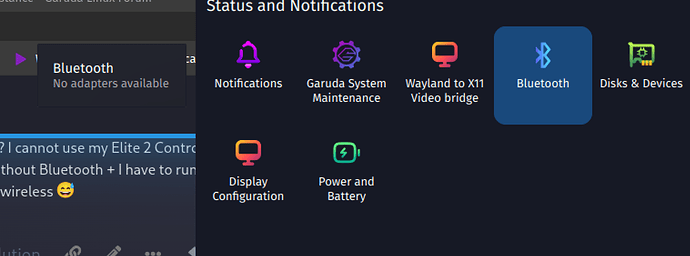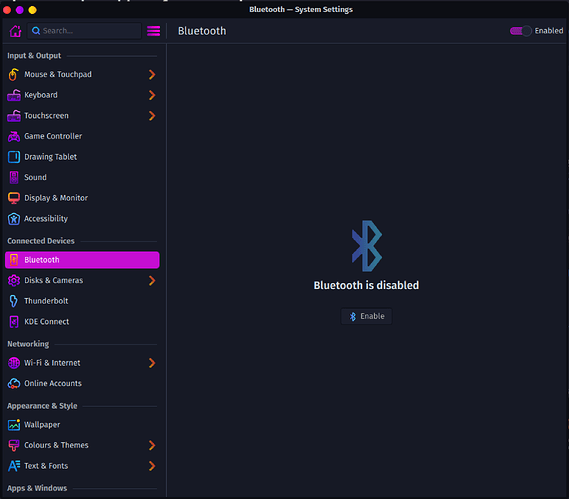I have recently updated my system, to get newest drivers including my graphics driver (for a different issue I have open), since then I lost access to my bluetooth, the adapter is still detected in the devices, however I cannot use it for a bluetooth device.
System:
Kernel: 6.9.9-zen1-1-zen arch: x86_64 bits: 64 compiler: gcc v: 14.1.1
clocksource: tsc avail: hpet,acpi_pm
parameters: BOOT_IMAGE=/@/boot/vmlinuz-linux-zen
root=UUID=a849b8d3-df35-4016-9939-3d9a1b4f0f93 rw rootflags=subvol=@
quiet resume=UUID=558af46d-a0d0-4916-9a21-aa00fc0a212f loglevel=3 ibt=off
Desktop: KDE Plasma v: 6.1.2 tk: Qt v: N/A info: frameworks v: 6.4.0
wm: kwin_wayland with: krunner vt: 1 dm: SDDM Distro: Garuda
base: Arch Linux
Machine:
Type: Desktop System: ASRock product: Z790 PG Lightning v:N/A
serial: <superuser required>
Mobo: ASRock model: Z790 PG Lightning serial: <superuser required>
uuid: <superuser required> UEFI: American Megatrends LLC. v: 13.02
date: 06/27/2024
Battery:
ID-1: hidpp_battery_0 charge: 80% condition: N/A volts: 4.0 min: N/A
model: Logitech G502 LIGHTSPEED Wireless Gaming Mouse type: N/A
serial: <filter> status: discharging
CPU:
Info: model: 13th Gen Intel Core i9-13900KF bits: 64 type:MST AMCP
arch: Raptor Lake gen: core 13 level: v3 note: check built: 2022+
process: Intel 7 (10nm) family: 6 model-id: 0xB7 (183) stepping: 1
microcode: 0x125
Topology: cpus: 1x cores: 24 mt: 8 tpc: 2 st: 16 threads: 32 smt: enabled
cache: L1: 2.1 MiB desc: d-16x32 KiB, 8x48 KiB; i-8x32 KiB, 16x64 KiB
L2: 32 MiB desc: 8x2 MiB, 4x4 MiB L3: 36 MiB desc: 1x36 MiB
Speed (MHz): avg: 1597 high: 2800 min/max: 800/5500:5800:4300 scaling:
driver: intel_pstate governor: powersave cores: 1: 1371 2: 800 3: 2539
4: 2542 5: 1758 6: 800 7: 1897 8: 800 9: 2416 10: 2605 11: 800 12: 800
13: 1399 14: 800 15: 2800 16: 2600 17: 2019 18: 2003 19:1410 20: 1988
21: 1998 22: 1888 23: 2096 24: 2081 25: 1982 26: 800 27:800 28: 1923
29: 800 30: 800 31: 800 32: 994 bogomips: 191692
Flags: avx avx2 ht lm nx pae sse sse2 sse3 sse4_1 sse4_2 ssse3 vmx
Vulnerabilities: <filter>
Graphics:
Device-1: NVIDIA AD104 [GeForce RTX 4070 Ti] vendor: Micro-Star MSI
driver: nvidia v: 555.58.02 alternate: nouveau,nvidia_drm non-free: 550.xx+
status: current (as of 2024-06) arch: Lovelace code: AD1xx
process: TSMC n4 (5nm) built: 2022+ pcie: gen: 4 speed: 16 GT/s lanes: 16
ports: active: none off: DP-1,DP-2,HDMI-A-1 empty: DP-3 bus-ID: 01:00.0
chip-ID: 10de:2782 class-ID: 0300
Device-2: HTC (High Tech ) Vive driver: uvcvideo type: USBrev: 2.0
speed: 480 Mb/s lanes: 1 mode: 2.0 bus-ID: 1-11.1.2:16 chip-ID: 0bb4:2c87
class-ID: 0e02
Display: wayland server: X.org v: 1.21.1.13 with: Xwaylandv: 24.1.1
compositor: kwin_wayland driver: X: loaded: nvidia unloaded: modesetting
alternate: fbdev,nouveau,nv,vesa gpu: nvidia d-rect: 2537x1097
display-ID: 0
Monitor-1: DP-1 pos: primary,left res: 1920x1080 size: N/Amodes: N/A
Monitor-2: DP-2 pos: right res: 617x1097 size: N/A modes: N/A
API: EGL v: 1.5 hw: drv: nvidia platforms: device: 0 drv: nvidia device: 2
drv: swrast gbm: drv: nvidia surfaceless: drv: nvidia wayland: drv: nvidia
x11: drv: zink inactive: device-1
API: OpenGL v: 4.6.0 compat-v: 4.5 vendor: nvidia mesa v: 555.58.02
glx-v: 1.4 direct-render: yes renderer: NVIDIA GeForce RTX 4070 Ti/PCIe/SSE2
memory: 11.71 GiB display-ID: :1.0
API: Vulkan v: 1.3.279 layers: 11 device: 0 type: discrete-gpu name: NVIDIA
GeForce RTX 4070 Ti driver: nvidia v: 555.58.02 device-ID: 10de:2782
surfaces: xcb,xlib,wayland
Audio:
Device-1: Intel Raptor Lake High Definition Audio vendor: ASRock
driver: snd_hda_intel v: kernel alternate: snd_soc_avs,snd_sof_pci_intel_tgl
bus-ID: 00:1f.3 chip-ID: 8086:7a50 class-ID: 0403
Device-2: NVIDIA AD104 High Definition Audio vendor: Micro-Star MSI
driver: snd_hda_intel v: kernel pcie: gen: 4 speed: 16 GT/s lanes: 16
bus-ID: 01:00.1 chip-ID: 10de:22bc class-ID: 0403
Device-3: C-Media USB Audio Device
driver: hid-generic,snd-usb-audio,usbhid type: USB rev: 1.1 speed: 12 Mb/s
lanes: 1 mode: 1.1 bus-ID: 1-11.1.4:17 chip-ID: 0d8c:0012 class-ID: 0300
Device-4: RODE Microphones NT-USB driver: hid-generic,snd-usb-audio,usbhid
type: USB rev: 1.1 speed: 12 Mb/s lanes: 1 mode: 1.1 bus-ID: 1-4:3
chip-ID: 19f7:0003 class-ID: 0300
API: ALSA v: k6.9.9-zen1-1-zen status: kernel-api with: aoss
type: oss-emulator tools: N/A
Server-1: PipeWire v: 1.2.1 status: active with: 1: pipewire-pulse
status: active 2: wireplumber status: active 3: pipewire-alsa type: plugin
4: pw-jack type: plugin tools: pactl,pw-cat,pw-cli,wpctl
Network:
Device-1: Realtek RTL8125 2.5GbE vendor: ASRock driver: r8169 v: kernel
pcie: gen: 2 speed: 5 GT/s lanes: 1 port: 3000 bus-ID: 04:00.0
chip-ID: 10ec:8125 class-ID: 0200
IF: enp4s0 state: up speed: 1000 Mbps duplex: full mac: <filter>
Info: services: NetworkManager,systemd-timesyncd
Bluetooth:
Device-1: Cambridge Silicon Radio Bluetooth Dongle (HCI mode) driver: btusb
v: 0.8 type: USB rev: 1.1 speed: 12 Mb/s lanes: 1 mode: 1.1 bus-ID: 1-2.1:4
chip-ID: 0a12:0001 class-ID: e001
Report: btmgmt ID: hci0 rfk-id: 0 state: up address: N/A
Report-ID: ID: hci1 rfk-id: 1 state: up address: N/A
Drives:
Local Storage: total: 1.87 TiB used: 110.56 GiB (5.8%)
SMART Message: Unable to run smartctl. Root privileges required.
ID-1: /dev/nvme0n1 maj-min: 259:0 vendor: solidgm model: SSDPFKKW010X7
size: 953.87 GiB block-size: physical: 512 B logical: 512 B speed: 63.2 Gb/s
lanes: 4 tech: SSD serial: <filter> fw-rev: 001C temp: 45.9 C scheme: GPT
ID-2: /dev/nvme1n1 maj-min: 259:5 vendor: Samsung
model: SSD 970 EVO Plus 1TB size: 931.51 GiB block-size:physical: 512 B
logical: 512 B speed: 31.6 Gb/s lanes: 4 tech: SSD serial: <filter>
fw-rev: 4B2QEXM7 temp: 39.9 C scheme: GPT
ID-3: /dev/sda maj-min: 8:0 vendor: Kingston model: DataTraveler 3.0
size: 28.82 GiB block-size: physical: 512 B logical: 512B type: USB
rev: 3.2 spd: 5 Gb/s lanes: 1 mode: 3.2 gen-1x1 tech: N/A serial: <filter>
SMART Message: Unknown USB bridge. Flash drive/Unsupportedenclosure?
Partition:
ID-1: / raw-size: 896.94 GiB size: 896.94 GiB (100.00%)
used: 110.56 GiB (12.3%) fs: btrfs dev: /dev/nvme1n1p2 maj-min: 259:7
ID-2: /boot/efi raw-size: 300 MiB size: 299.4 MiB (99.80%)
used: 588 KiB (0.2%) fs: vfat dev: /dev/nvme1n1p1 maj-min: 259:6
ID-3: /home raw-size: 896.94 GiB size: 896.94 GiB (100.00%)
used: 110.56 GiB (12.3%) fs: btrfs dev: /dev/nvme1n1p2 maj-min: 259:7
ID-4: /var/log raw-size: 896.94 GiB size: 896.94 GiB (100.00%)
used: 110.56 GiB (12.3%) fs: btrfs dev: /dev/nvme1n1p2 maj-min: 259:7
ID-5: /var/tmp raw-size: 896.94 GiB size: 896.94 GiB (100.00%)
used: 110.56 GiB (12.3%) fs: btrfs dev: /dev/nvme1n1p2 maj-min: 259:7
Swap:
Kernel: swappiness: 133 (default 60) cache-pressure: 100 (default) zswap: no
ID-1: swap-1 type: zram size: 31.17 GiB used: 0 KiB (0.0%)priority: 100
comp: zstd avail: lzo,lzo-rle,lz4,lz4hc,842 max-streams:32 dev: /dev/zram0
ID-2: swap-2 type: partition size: 34.28 GiB used: 0 KiB (0.0%)
priority: -2 dev: /dev/nvme1n1p3 maj-min: 259:8
Sensors:
System Temperatures: cpu: 38.0 C mobo: N/A
Fan Speeds (rpm): N/A
Info:
Memory: total: 32 GiB available: 31.17 GiB used: 4.04 GiB (13.0%)
Processes: 566 Power: uptime: 0m states: freeze,mem,disk suspend: deep
avail: s2idle wakeups: 0 hibernate: platform avail: shutdown, reboot,
suspend, test_resume image: 12.43 GiB services: org_kde_powerdevil,
power-profiles-daemon, upowerd Init: systemd v: 256 default: graphical
tool: systemctl
Packages: 1908 pm: pacman pkgs: 1893 libs: 559
tools: octopi,pamac,paru,yay pm: flatpak pkgs: 15 Compilers: clang: 18.1.8
gcc: 14.1.1 Shell: garuda-inxi default: fish v: 3.7.1 running-in: konsole
inxi: 3.3.35
Garuda (2.6.26-1):
System install date: 2024-06-29
Last full system update: 2024-07-21
Is partially upgraded: No
Relevant software: snapper NetworkManager dracut nvidia-dkms
Windows dual boot: Probably (Run as root to verify)
Failed units:
I can see it listed under usb devices
ub
Bus 001 Device 002: ID 174c:2074 ASMedia Technology Inc. ASM
1074 High-Speed hub
Bus 001 Device 003: ID 19f7:0003 RODE Microphones RODE NT-US
B
Bus 001 Device 004: ID 0a12:0001 Cambridge Silicon Radio, Lt
d Bluetooth Dongle (HCI mode)
Bus 001 Device 005: ID 0fd9:0060 Elgato Systems GmbH Stream
Deck
Bus 001 Device 006: ID 05ac:0250 Apple, Inc. Aluminium Keybo
ard (ISO)
Bus 001 Device 007: ID 046d:c539 Logitech, Inc. Lightspeed R
eceiver
Bus 001 Device 008: ID 1b1c:0c1a Corsair CORSAIR Lighting No
de CORE
Bus 001 Device 009: ID 0bb4:2744 HTC (High Tech Computer Cor
p.) Vive Hub (HTC CB USB2)
Bus 001 Device 010: ID 256c:006e Tablet Monitor
Bus 001 Device 011: ID 0bb4:2134 HTC (High Tech Computer Cor
p.) Vive Hub (SMSC USB2137B)
Bus 001 Device 012: ID 26ce:01a2 ASRock LED Controller
Bus 001 Device 013: ID 0bb4:0306 HTC (High Tech Computer Cor
p.) Vive Hub Bluetooth 4.1 (Broadcom BCM920703)
Bus 001 Device 014: ID 28de:2000 Valve Software Lighthouse F
PGA RX
Bus 001 Device 015: ID 0424:274d Microchip Technology, Inc.
(formerly SMSC) HTC Hub Controller
Bus 001 Device 016: ID 0bb4:2c87 HTC (High Tech Computer Cor
p.) Vive
Bus 001 Device 017: ID 0d8c:0012 C-Media Electronics, Inc. U
SB Audio Device
Bus 001 Device 018: ID 0bb4:2c87 HTC (High Tech Computer Cor
p.) Vive
Bus 001 Device 019: ID 28de:2101 Valve Software Watchman Don
gle
Bus 001 Device 020: ID 28de:2101 Valve Software Watchman Don
gle
Bus 002 Device 001: ID 1d6b:0003 Linux Foundation 3.0 root h
ub
Bus 002 Device 002: ID 0951:1666 Kingston Technology DataTra
veler 100 G3/G4/SE9 G2/50 Kyson
Bus 002 Device 003: ID 0bb4:5744 HTC (High Tech Computer Cor
p.) CB USB3
Bus 002 Device 004: ID 174c:3074 ASMedia Technology Inc. ASM
1074 SuperSpeed hub
I have unplugged it and plugged back in and found that it is the Bus 001 Device 004: ID 0a12:0001 Cambridge Silicon Radio, Lt
d Bluetooth Dongle (HCI mode)


